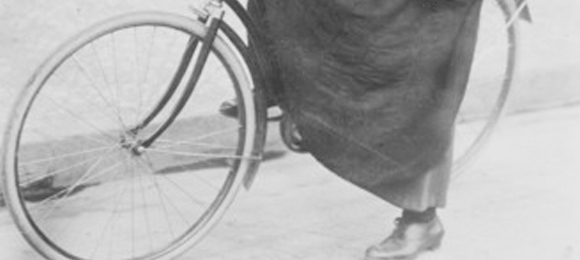Aunt Mary was as straight-backed, chin-upped, long-skirted and white–haired as old Queen Mary herself. The posture came from corsets. I tried one on at a costume museum once. Made me look regal.
Aunt Mary was my mother’s aunt, which would make her my great aunt. She was born sometime in the eighteen-eighties and died sometime in the nineteen- fifties. All I knew of her was one photograph and my mother’s reminiscences. My mother adored her Aunt Mary. She was the freethinker in a family of thirteen everyday conservatives.
When my mother was expecting her first child. She asked Aunt Mary what it felt like to give birth.
“It’s like bein’ constipated. On’ tha’ shits a football, lass.”
That’s the thing about photographs, isn’t it? They’re silent.
My mother’s family is from Warrington, England, the Lancashire side. It was a town renowned for its wire rope, tanneries and soap. And in between the steel works and the pin factories there were breweries and abattoirs. And in between the alehouses and the slaughter houses there were brick lines of cottages, and terraces; arched entrances leading to courts of three storey buildings; steep steps up to dark doors; gutters down the center of the yard; a single storey toilet house at one end. Sunlight could scarcely enter; nothing green forced a foothold between the cobbles and the bricks. Fog drifts across the photographs.
That’s another thing about photographs. They don’t record the smell.
The families who lived and worked here were close. When “Our Mary” went to the butchers at the corner of the row to collect the day’s order the court would look out for “Grimshaw’s Mary”. Her six year old self would get there and back, far safer than the houses that dripped around her. It was only when a generation got some university education that many families moved further than six streets to the left, six streets to the right. It’s easier to stand on your merits when you leave the place where everybody knows your every move. And when you can stand on you merits it’s easier to be yourself. But that was to be my mother’s generation. Aunt Mary only had a bicycle.
Aunt Mary didn’t marry young but by the time the First War ended she had two young daughters to care for, alone. Her husband had signed up for the shilling a day, joined the second battalion of the South Lancashire regiment and went missing in action on June 15th, 1917. Aunt Mary supported herself and her daughters collecting penny insurance premiums door to door. By the time she met a new man her husband had been missing twelve years. She could easily have had him declared dead. Half the British infantrymen killed in that war were never identified. She didn’t. She divorced him.
Another thing about that deeply conservative family was that it was a deeply conservative Catholic family. Aunt Mary told no one about the divorce and took herself, on her bicycle, to a parish five miles away to go to Mass every Sunday morning. No mere man was going to deny her the sacraments.
When my mother married the Church denied her a Nuptial Mass, and forbade music at the wedding. That was because my father was from a family of Methodists. He was also from the Cheshire side of Warrington, a foreigner in her family’s eyes. Neither his parents nor hers would attend the wedding. That was when Aunt Mary told my mother her story. A story she had not told anyone else.
She told my mother that in September 1939 her former, ex, late, missing, husband had moved into the back-to-back houses on the street behind her, with his Belgian wife. He hadn’t died a nasty, messy, unidentified death; he’d deserted. And now he was home and no-one said anything, because that would betray him, and no-one refused him the sacraments.
Aunt Mary was not going to stand at the butcher’s counter while other women gossiped and placed their orders across her and the butcher handed her packet over in silence.
And she was not going to be denied God.
I don’t go to church, and I don’t wear corsets and I don’t look regal. I’m a twenty-first century woman with a university education and my husband has never had to go to war. But the moving truck has gone and my two boys are waiting in the car. My fourteen year old daughter has been with my mother for six months, ever since she told me what my husband had done to her that night.
I pick up Aunt Mary’s silent photograph and say goodbye to house and husband forever.
